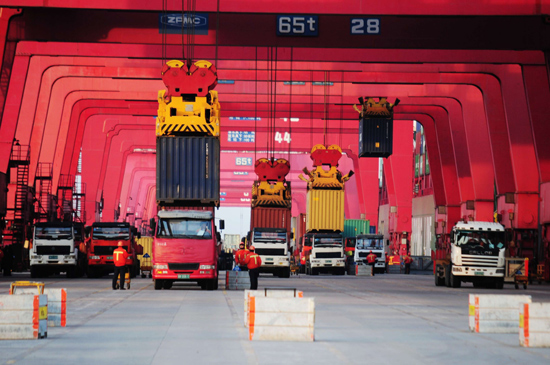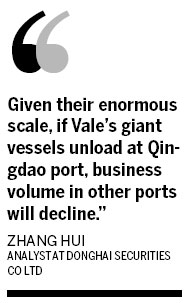 |
|
|
|
|||||||||||
 Containers unloaded from trucks at Qingdao port in Shandong province. The port intends to build a 300,000-ton oil terminal this year, in addition to the 400,000-ton Dongjiakou ore terminal. [Photo / China Daily] |
Vale's giant vessels still prohibited from entering despite expansion
China's Qingdao Port (Group) Co expects to start operating its 400,000-ton Dongjiakou ore terminal this year, Group Chairman Chang Dechuan said while attending the annual parliamentary session in Beijing on Wednesday.
Analysts said the terminal would have the capacity to handle Brazilian miner Vale SA's giant vessels, which have been barred from Chinese ports over safety concerns.
But Chang said the miner had not contacted the port to discuss access for its vessels. "Neither have we done safety studies about letting Vale's vessels dock at our terminal," Chang said, declining to elaborate.
Vale has invested $2.3 billion in 19 of the 400,000-ton giant bulk carriers and will control another 16 under long-term contracts, according to the company.
The miner currently operates five Valemax vessels, but none has visited a Chinese port since being put into service in May.
Vale did unload its 388,000-ton Berge Everest at Dalian port on Dec 28, prompting protests from domestic shipping companies and the China Shipowners' Association.

On Jan 31, the Ministry of Transport tightened port regulations, so no Chinese port was allowed to accommodate vessels exceeding 300,000 tons. This move effectively prevented Vale's vessels from docking at the nation's ports.
A few weeks later, Brazilian Vice-President Michel Temer brought up the issue in a meeting with Vice-Premier Wang Qishan.
Analysts said Qingdao port would face pressure if it accommodated Vale's giant vessels at the new terminal.
"Given their enormous scale, if Vale's giant vessels unload at Qingdao port, business volume in other ports will decline," said Zhang Hui, an analyst with Donghai Securities Co Ltd.
In the meantime, Vale might attain a monopoly on the transport of iron ore, which would hurt China's shipping companies and steel mills, he added.
Thwarted attempts
Chang also expressed concerns about the port's plan to go public within the next five years. "We have encountered some problem in asset stripping," Chang said, without elaborating.
The port has been trying to obtain a listing for the past decade, Chang said, adding that he was "pessimistic" about the prospects of an IPO.
Analysts said the failure to get a stock market listing won't affect the port.
Given the weak growth in trade volumes, ports don't need to raise money on the capital markets to invest heavily in infrastructure or increase capacity, Zhang said.
Nonetheless, Chang said that Qingdao port intends to build a 300,000-ton oil terminal this year, in addition to the Dongjiakou ore terminal, as well as a coal terminal whose capacity "is still under discussion".
The port's investment budget this year would be 4 billion yuan ($625 million), Chang said, and it would invest 30 billion yuan over the five-year period starting this year.
China's trade performance has been rocky in recent months. In January, trade fell 7.8 percent year-on-year to $273 billion. Exports fell 0.5 percent to $150 billion, while imports slid 15.3 percent to $123 billion, according to the Ministry of Commerce.